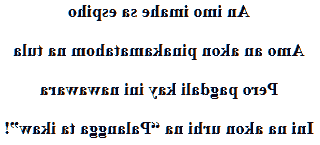Masbateño love poem
An espiho
An imo imahe sa espiho
Amo an akon pinakamatahom na tula
Pero pagdali kay ini nawawara
Ini na akon urhi na “Palangga ta ikaw”!


→ French poem ←
Masbateño language
A short translation of my love poem in Minasbate (Masbateño, autonym Masbatenyo) language. This Austronesian, Malayo-Polynesian, Central Visayan language is spoken in the Masbate province (Masbate, Ticao, and Burias Islands) in the Philippines.
Minasbate, shares some similarities with Capiznon, Hiligaynon, and Sorsoganon.
Also influenced by Waray, Bicolano, and Cebuano, it has approximately 600,000 speakers. For less than one-eighth of them, it is their mother tongue.
The Minasbate (Masbatenyo) people use it to communicate with each other, and teach it in their schools.
Generally, this language is divided into three dialectal variants: northern, southern, and western. This translation comes from the capital, the city of Masbate, where people speak the northern dialect.
Masbate
The province of Masbate, which is in the center of the Philippines, includes three main islands (Masbate, the largest, Burias to the north and Ticao to the east) and 15 smaller islands.
Their central location has long made these islands a crossroads, a melting pot of cultures and languages. Particularly, in the 1960s, when a massive influx of migrants settled there.
The word Masbate has a controversial origin... mas bati (better understood), masa batí (to mix, beat), or perhaps basbat, which refers to its gold mines.
After Indonesian and Chinese traders, these volcanic islands were reached in the 16th century by the Spanish (Luiz Enriquez de Guzman).
Masbate's wealth is based on fishing, crops (rice, coconuts (copra), corn, and tobacco), livestock, and mining, particularly gold and manganese.